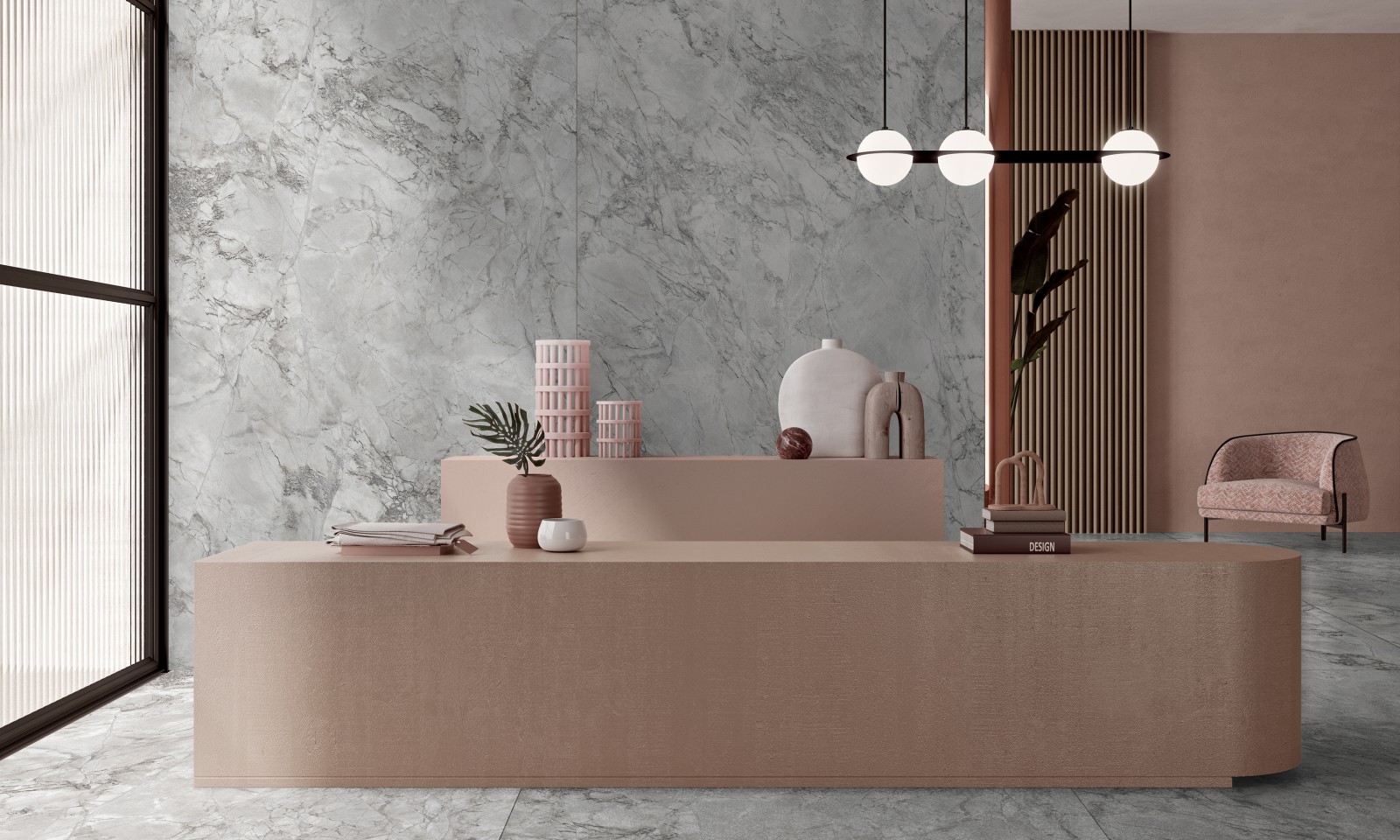ArtsCutZERO
1Is ArtsCutZERO the same as engineered stone?
Both products are manufactured using similar processes but differ notably in their raw material composition. Engineered stone is a man-made surface formed by combining and heat-curing natural stone materials containing crystalline silica—such as quartz or stone aggregates—with resins, water, and pigments. In contrast, AC Stone ArtsCutZERO is produced from a blend of over 85% recycled glass, along with polymer resins and pigments.
2Is engineered stone banned in Australia?
Yes, engineered stone will be banned in Australia starting July 1st, 2024. As a leading stone manufacturer and supplier, AC Stone takes pride in our ability to adapt quickly to industry changes. We have already developed ArtsCutZERO, a crystalline silica-free surface solution suitable for kitchen benchtops. In addition, we offer Portofino Porcelain, a versatile surface ideal for a range of applications throughout the home, including kitchen benchtops, bathrooms, laundries, and outdoor dining areas.
3Will AC Stone honour its warranty on engineered stone surfaces that are banned?
All AC Stone products come with a 15-year warranty, which are not impacted by these changes.
4Can I purchase directly from AC Stone?
No, AC Stone is a wholesale supplier and does not sell directly to the public. All purchases must be arranged through your designated stonemason. Please note that cabinet makers or builders are also required to place orders through their nominated stone fabricator.
5What are the dimensions of ArtsCutZERO surfaces?
1620x3220x20mm
6Where can I find the testing results for ArtsCutZERO?
All test results are available for download can be found in 'Technical Documents' under the 'Resources' tab.
7Is the existing crystalline silica stone surface safe in my home?
AC Stone can confidently assure you that our surfaces are completely safe for everyday use. The potential risk arises only during the fabrication stage, where fabricators may be exposed to fine crystalline silica dust if correct safety protocols are not strictly followed.
8How many finishes does ArtsCutZERO surfaces come in?
Depending on the colour, AC Stone ArtsCutZERO offers three types of finishes: Gloss, Matt and Leather.
9Can ArtsCutZERO surfaces be used as a splashback for gas or induction cooktops?
For gas cooktops: A minimum distance of 200 mm is required from the edge of the gas burner to the AC Stone ArtsCutZERO splashback, in accordance with AS/NZ 5601 Gas Installations.
For induction cooktops: A minimum distance of 50 mm is required from the splashback to the heat source.
If your splashback distance does not meet these requirements, please consider using our Portofino Porcelain range.
10Does ArtsCutZERO surfaces require sealing?
No, our surfaces are virtually nonporous and require no additional protection in the form of sealer or wax.
Portofino Porcelain
1What is porcelain?
Porcelain is a ceramic material, made from heating various materials including kaolinite at a very high temperature. Porcelain is an incredibly versatile and strong surface.
2What can I use porcelain for?
Porcelain can be used for kitchen bench tops, counter tops, splash backs, feature walls, flooring as well as any outdoor area. Different Porcelain surfaces may have varied applications depending on which design you are selecting.
3What dimensions are your Portofino Porcelain slabs?
Different Porcelain designs may vary in size:
For 12mm, the dimensions are: 1600 x 3200 x 12mm.
For 20mm, the dimensions are: 1635x3230x20mm.
4What is the difference between sintered stone and porcelain?
While sintered stone and porcelain share similarities as durable surface materials, they differ significantly in their composition, manufacturing process, and applications.
Composition
Sintered Stone: Composed of a blend of natural minerals such as quartz, feldspar, and other raw materials, sintered stone combines elements commonly found in both natural stone and ceramics. These materials are compacted under high pressure and heat to form a dense, durable surface.
Porcelain: As a ceramic material, porcelain primarily consists of kaolin clay, feldspar, and silica. Its composition is more clay-based, aligning it with the ceramic family, and results in a non-porous, hard surface when fired.
Production Process
Sintered Stone: The term "sintered" refers to a process in which mineral particles are fused at a molecular level using extreme heat and pressure—without the use of binders. This advanced process mimics the natural formation of stone, compressing timeframes into hours instead of centuries.
Porcelain: Porcelain is produced using traditional ceramic techniques. The material is shaped, dried, and fired at high temperatures to achieve strength and density. Unlike sintered stone, it does not undergo the same level of compaction or pressure during production.
5Is Portofino porcelain heat resistant?
AC Stone Portofino porcelain range offers excellent heat resistance due to its ceramic composition. However, as a precaution, we recommend using a heat trivet or chopping board when placing hot items directly from the oven or stove onto the surface to prevent any potential damage.
6What thickness options are available for Portofino porcelain?
Portofino porcelain is available in two thicknesses: 12mm and 20mm.
7Is a porcelain benchtop easy to crack?
Porcelain benchtops are highly durable and resistant to cracking under normal use, thanks to their density and strength. However, they may crack if exposed to significant impact—such as a heavy item being dropped—or if not installed correctly. Ensuring proper installation and handling is essential to reduce the risk of damage.
Ultra Thin Surfaces
1What is Ultra Thin Natural Surface?
Natural Stone, otherwise known as marble is a natural surface made from heating and compressing sedimentary limestone. Natural Stone is highly sought for due to its luxurious and authentic designs.
AC Stone currently carries Ultra Thin Natural Surface, which is made from cutting a very thin layer of 100% natural stone and combined with stone adhesive, fibreglass and polyester backplane, to create a remarkably flexible, durable and versatile surface.
2What can Ultra Thin Natural Surface be used for?
Ultra Thin Natural Surface can be used for walls, feature walls and furniture applications.
Warranty
1What is your warranty?
We have a 15-year limited warranty. You can read more on our warranty page.


